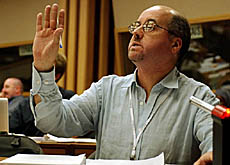NGOs criticise draft summit action plan

Civil society groups at the World Summit on the Information Society (WSIS) have criticised a draft action plan and declaration that aim to bridge the digital divide.
They have also complained that their ideas and opinions were not fully taken into account during the run-up to the conference.
“The official draft documents represent the lowest common denominator of what could have been achieved,” Wolfgang Kleinwächter, a spokesman for civil society at the summit, told swissinfo.
Confronting what they view as a lack of focus on “human needs”, non-governmental organisations (NGOs) launched their own vision for the information society on Thursday.
“Our declaration represents a guideline and vision of what should be done in the future,” said Kleinwächter.
Exclusion
The WSIS marks the first time civil society has been formally included as a partner within a UN summit.
Civil society delegates – including human rights promoters, gender and youth experts, as well as academics, union representatives and members of the media – all took part in the conference’s preparatory phase.
But they now argue that their concerns and ideas were “repeatedly excluded by governments” in the painstaking negotiations that eventually resulted in a draft declaration of principles and plan of action for the summit on Tuesday.
“The last round of preparatory talks was totally closed to us,” said Chantal Peyer, a representative of the charity Bread for All and a member of the Swiss delegation in Geneva.
“We were informed of what was going on, but we weren’t consulted… so there was no participation or input on our behalf,” she told swissinfo.
She did, however, praise Switzerland for including three members of civil society in its official delegation.
Human rights
Both Peyer and Kleinwächter also concede that some of civil society’s contributions were incorporated into the official draft documents.
“Before the latest round of negotiations, we feared that the governments would actually take a step backwards in terms of human rights,” said Peyer.
“And we salute their success in making sure that references to human rights and freedom of the media were kept in the texts,” she added.
But for Kleinwächter, a last-minute compromise to include reference in the draft declaration to respect for the Universal Declaration of Human Rights reflects an outdated interpretation of human values.
“The governments are celebrating the fact that the right to freedom of expression, as stated in Article 19 of the Universal Declaration, is now the basis for the information society,” said Kleinwächter.
“But this [declaration] was adopted back in 1948 and so what we have now is a reaffirmation of the status quo,” he added.
“We wanted to see more than that, because Article 19 refers to information freedoms in the industrialised age, and now that we live in the cyber age we had hoped this summit would broaden understanding of these freedoms.”
Private sector
As well as governments and civil society, the private sector was also invited to take part in the summit discussions.
Earlier this week, members of the global business community gathered in Geneva said they welcomed the official draft texts, despite some reservations about their content.
“Aspects of the documents are not ideal from the business perspective, but business is nevertheless dedicated to working together with governments and other summit participants to finding workable solutions,” the group said in a statement.
“No matter what the outcome of this summit, business will remain the main investor, and main innovator, in the infrastructure, products, services, applications and content necessary for a truly global society,” it added.
Input to impact
For its part, civil society says that despite its criticism of the declaration and plan of action to be adopted on Friday, it will continue to work within the UN’s new multistakeholder framework in order to make its voice heard.
All parties seem to agree that the Geneva summit represents a positive first step towards the full participation of all stakeholders in future summits.
“Civil society has become better organised during this process… and between now and the second phase of the summit in Tunisia in 2005 we will call for more transparency and openness,” said Kleinwächter.
“We realise that it’s better to fight for input and then see whether we can have some impact,” he added.
“And so far, the recognition of civil society as stakeholders in the information society is probably the real success of this summit.”
swissinfo, Anna Nelson at the WSIS in Geneva
Representatives of civil society, who are attending the World Summit on the Information Society (WSIS) in Geneva, have criticised the gathering’s draft documents for not being “people-centred”.
They also said on Thursday that their ideas and opinions had not been sufficiently taken into consideration during the summit’s prepratory talks.
The WSIS marks the first time that civil society – including academics, representatives of interest groups and members of the media – has been included as a partner in a UN summit.
And despite their reservations over the summit’s plan of action and declaration of principles, they have vowed to continue working within the UN’s new multistakeholder framework as the conference heads towards its second phase in Tunisia in 2005.

In compliance with the JTI standards
More: SWI swissinfo.ch certified by the Journalism Trust Initiative











You can find an overview of ongoing debates with our journalists here . Please join us!
If you want to start a conversation about a topic raised in this article or want to report factual errors, email us at english@swissinfo.ch.